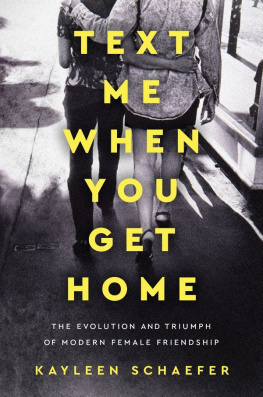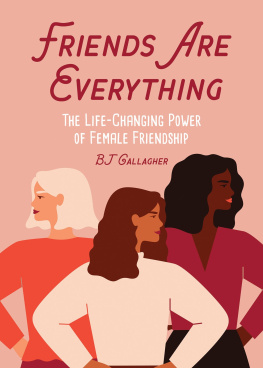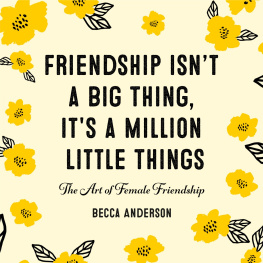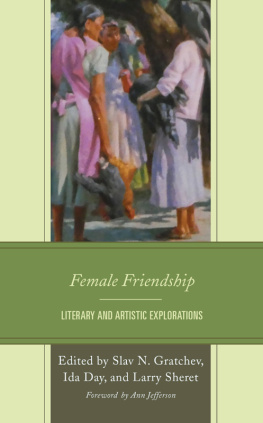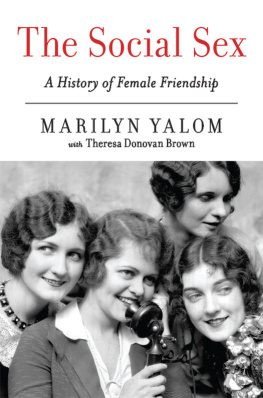Penguin supports copyright. Copyright fuels creativity, encourages diverse voices, promotes free speech, and creates a vibrant culture. Thank you for buying an authorized edition of this book and for complying with copyright laws by not reproducing, scanning, or distributing any part of it in any form without permission. You are supporting writers and allowing Penguin to continue to publish books for every reader.
DUTTON and the D colophon are registered trademarks of Penguin Random House LLC.
has been applied for.
While the author has made every effort to provide accurate telephone numbers, Internet addresses, and other contact information at the time of publication, neither the publisher nor the author assumes any responsibility for errors or for changes that occur after publication. Further, the publisher does not have any control over and does not assume any responsibility for author or third-party websites or their content.
INTRODUCTION
Why Women Tell Each Other, Text Me When You Get Home
Well, female friendships are fucking extraordinary.
Keira Knightley, actress
Text me when you get home. Usually its late when women say this to each other, the end of a night that at some point felt thrilling. We might have been at dinner, a concert, or a cocktail bar. We might have been just hanging out talking even though we knew wed be tired the next day. Maybe we shared secrets or surprise compliments (or both). Maybe we danced. Maybe we hugged with total joy. Maybe we were buoyed by booze or maybe we just felt light because of our love for each other.
My best friend, Ruthie, who lives a few blocks from me in Brooklyn, and I say it to each other after these kinds of nights. I love you, one of us will say. Text me when you get home, the other will say. Were saying the same thing.
I hear it on the street sometimes, like the other night when I passed a woman walking away from her group of girlfriends and into a rowdy crowd. Text me when you get home, one of her friends called after her. I hear it on television, too, on the HBO show Insecure, which is more about the star, Issa (Issa Rae), and her best friend, Molly (Yvonne Orji), than anything else. Text me when you get home, Issa tells Molly after Molly drops her off at her apartment just after two A.M.
Men do not tell their friends to text them when they get home. Some guy somewhere must have been worried about his buddy finding his way back okay at the end of a night, but he probably just said, Get home safe, or didnt say anything at all.
This is because women who say, Text me when you get home, arent just asking for reassurance that youve made it to your bed unharmed. Its not only about safety. Its about solidarity. Its about us knowing how unsettling it can feel when youve been surrounded by friends and then are suddenly by yourself again. Its about us understanding that women who are alone get unwanted attention and scrutiny. Should I hold my keys in my hand? Why is this driver talking so much? Is this guy following me? Am I too drunk? Is that guy who just said, Hey, gorgeous, going to say anything else? My place feels so empty.
Blythe Baird, a poet in her early twenties in Saint Paul, Minnesota, wrote, in a poem called Pocket-Sized Feminism:
We accept this state of constant fear
as just another part of being a girl.
We text each other when we get home
The words, and the corresponding texts we send when we do get home, are a web connecting us, winding through the many moments we spend together and apart, helping us understand that whenever were unmoored or terrified or irate or heartbroken or just bored, were not by ourselves. Its a way for women to tell each other, Im always with you. I wont forget about you when you walk away. I am here when Im standing in front of you or any other time you need me, no matter what.
Text me when you get home is not an aggressive rallying cry like the antiDonald Trump, pro-woman This pussy grabs back, but it does mark a sea change. Its a way women are saying, through our care for each other, that our friendships are not what society says they are. Were reclaiming them. Were taking them back from the shitty words theyve been smothered by for way too long:
Women cant get along.
Theyre probably lesbians.
Women who say they like each other are lying.
What a bunch of catty bitches.
Women ditch their friends when they meet a guy.
What were doing by holding each other close in whatever ways we can is lifting our friendships out of those stereotypes. Were not going to let the kinds of relationships we want to have be undermined any longer.
We wont accept that were mean girls or that our friends should be also-rans compared to our romantic partners or children or anyone else tied to us with an official title. It isnt true. Our friendshipsthe ones were living every daycan stand on their own. They are supportive, enthralling, entirely wonderful, and, often, all we need.
I wasnt raised to rely on women. Men were supposed to be my heroes and protectors. I grew up in a Texas town where the boys were football players and the girls were cheerleaders, and while there were many kids who were neither (including me), the caste system was set by those two types. Male athletes could do whatever they wanted. The quarterback used to sit behind me in history class and spit chewing tobacco into a soda can for the entire hour. A lot of the boys at school wore cowboy hats and boots, which I think, looking back, is a pretty good metaphor for how I grew up seeing men. There was a general vibe that the guys were capable in a way the girls were not.
This didnt bother me. I didnt know any different. My mom wouldnt have called herself a feminist then, and she wasnt trying to teach me to be one either. She would often say, Thank goodness for that nice man, when a male stranger would swoop in to help her. She would never tell me, You should never be dependent on a man.
I had female friends. They were fun to pinball through social events with, but I also always felt as though I was competing with them, for boys or grades or who looked the prettiest in group pictures.
I never thought much about whether all of this jockeying was necessary. It seemed like what I was supposed to be doing. And for a decade after Id left my hometown, through college and my first job, I held on to this behavior. For the most part, I saw other women as either enemies or superfluous. My vision of female friendship was fueled by popular girl-fight television shows and movies like Ally McBeal and Mean Girls. I also worked in a male-dominated office, where, as in high school, I saw the men as the stars. Women went to step classes or, worse, book clubs. The idea of leaning on them was as alien to me as hiring someone to do my laundry.
I didnt expect to end up where I am now, making female friendship the center of my story. But when I decided I wasnt ready to marry my long-term boyfriend in my early thirties, I looked around, and instead of being unsure, I was inspired. Surrounding me were a bunch of women who were doing exactly what I wanted to do: striving to do good work, setting themselves apart, and aligning themselves with other amazing people. They were also really fun. I wanted to spend whatever time I could with them. This crew, these women who I think are the coolest, became essential to my identity and psyche. Someone once described female friendship to me as a soft place to land, and it was.

